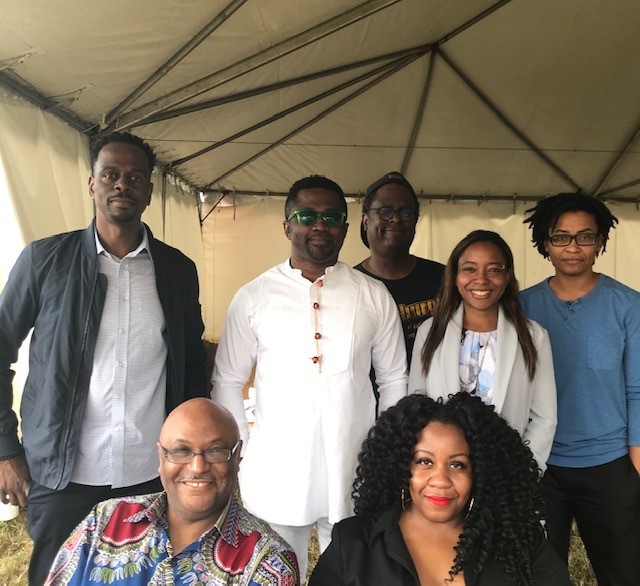2020-2021 Afrofuturism Syllabus - Week 9 - Dr. Chesya Burke on Reimagining the Future
Image: Participants in the Afrofuturism Writers' Pavilion at the 2020 Zora Neale Hurston Festival of the Arts and Humanities. Dr. Burke is in the front row, far right. Front row, left to right: Maurice Broaddus, Dr. Chesya Burke. Back row, left to right: P. Djèlí Clark, Dr. Iheoma Nwachukwu, Bill Campbell, Dr. Michele Tracey Berger, Tenea D. Johnson. Image Credit: Dr. Michele Tracey Berger.
Welcome to Week 9 of the ZORA! Festival 2020-2021 Afrofuturism Course!
Please begin by reviewing About the Course for an introduction and orientation to the 2020-2021 Afrofuturism Syllabus, which bridges the organizing themes of the first two years of the five-year Afrofuturism Conference Cycle: "What is Afrofuturism?" and "What is the Sound of Afrofuturism?"
Note: Each week the course coordinator will release new content related to the conference themes. Content posted here will remain publicly accessible and may be incorporated into other courses, in part or in full, via links to this site. Suggested citation: French, Scot. Syllabus for ZORA! Festival Afrofuturism Course, University of Central Florida, Orlando, Fall 2020-Spring 2021. STARS, https://stars.library.ucf.edu/afrofuturism_syllabus_about/.
Conversations
In the Conversations segment we share resources featuring participants in the 2020-2021 ZORA! Festival Afrofuturism Conference.
This week’s featured Conversation is a podcast interview with writer Chesya Burke, a participant in the Afrofuturism Writers’ Pavilion at the 2020 ZORA! Festival.
Dr. Burke is an Assistant Professor of English and U.S. Literatures at Stetson University. Her primary areas of study are in African American literature, race and gender studies, comics and speculative fiction. She received her Master’s degree in African American Studies from Georgia State University and her Ph.D. at the University of Florida. Her dissertation, "#Hashtag, Black Girl Magic: Reimaging Black Women Fluid Artists Within the Spirituality of Womanism," situates Black Girl Magic within a theoretical continuum which examines Black women’s use of social activism to voice change and how this social activism influences social consciousness and popular culture.
Dr. Burke has written and published over a hundred fiction pieces and articles within the genres of science fiction, fantasy, comics and horror. She is the Co-Chair of Wiscon's Anti-Abuse Team, which is a national science fiction feminist conference, and her story collection, Let's Play White, is being taught in universities around the world. Poet Nikki Giovanni compared her writing to that of Octavia Butler and Toni Morrison, and Samuel Delany called her "a formidable new master of the macabre." Dr. Burke's novel, The Strange Crimes of Little Africa, has garnered critical acclaim by writers such as Tananarive Due and Kiese Laymon.
This interview was conducted by Tiffany Pennamon, a Ph.D. candidate in English at the University of Florida, during the ZORA! Festival Afrofuturism Conference on Jan. 30, 2020. It lasts about 20 minutes.
You can find the interview here.

Explorations
In the Explorations segment we pose a series of questions for further investigation and class discussion, based on the featured Conversation. As you listen to the podcast interview, consider the following questions:
- Like other Afrofuturist writers and artists, Burke defines Afrofuturism by reference to the West African symbol/concept of Sankofa. What is the meaning of Sankofa, and how does it apply to Afrofuturism?
- As a writer of historical fiction, Dr. Burke says she uses her literary imagination to create a "speculative past" that offers a brighter, more dynamic future for Black people trapped in a racist, repressive society. She imbues her characters -- typically young Black girls of the 1950s and 1960s -- with powers that allow them to maneuver within society and resist their oppression. Does she think Black speculative writers have a responsibility to promote Black consciousness and a Black liberationist ideology?
- Dr. Burke finds inspiration in the life and writings of Zora Neale Hurston, but differs from Hurston in some important aspects. How so?
- What is #BlackGirlMagic? Can one draw a thematic connection between #BGM, Afrofuturism, and iconic black female literary-historical figures such Harriet Tubman, Sojourner Truth, Zora Neale Hurston, and Audre Lorde?
- Black Dracula/Blacula (1972)
- #BlackGirlMagic
- Harriet Tubman
- Sojourner Truth
- Zora Neale Hurston
- Audre Lorde
References
Authors, artists, and works referenced in the podcast include:
Next week: An interview with P. Djèlí Clark, a writer of speculative fiction, including The Black God's Drums and The Haunting of Tram Car 015. In this conversation, he recounts the complex journey that defines his black speculative practice.

